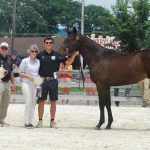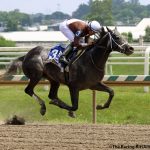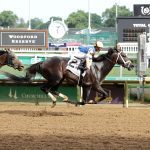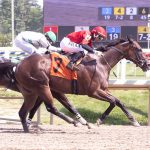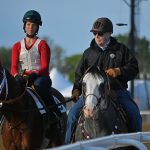After long career, Frank Petramalo steps away
“Nobody makes money on racing without alternate gaming except for someplace like Del Mar or Saratoga,” says Frank Petramalo, retiring at year’s end as the head of the Virginia Horsemen’s Benevolent and Protective Association (VHBPA). “[Colonial Downs] is one of the few tracks that you can go to where you actually have a future ahead of you, as opposed to just holding on to what you already have.”
That’s in no small measure due to the work of Petramalo’s group, along with the other members of the Virginia Equine Alliance: the Virginia Thoroughbred Association, Virginia Harness Horse Association, and Virginia Gold Cup.
Petramalo has gone through the cycle in his tenure of as executive director and general counsel for the Virginia horsemen. He steps back from his daily duties with the status of Virginia racing much as he first found it: on an upward trajectory, with a wave of optimism and a tinge of concern.
Colonial Downs, shuttered for six years, is back in operation, with purses at record levels and racedays growing. Harness racing is back, too. It was hard to see that coming in 2013 and 2014, when Colonial closed with then-owner Jeff Jacobs claiming the track was losing money.
“Our success here in Virginia has resulted from the fact of cooperation between all the segments of the horse industry: thoroughbred, standardbred, breeders and steeplechase,“ observed Petramalo. “In just about any state that you go to, you see friction [among groups]. We’ve always been on the same page and had a unified front with the formation of the VEA and willingness to share revenue among everybody.”
Back in 2013, in lieu of a meet that had grown as long as 45 days before shrinking to 25, Jacobs proposed racing on a grand scale over two weekends a year with six days of racing, offering $1 million per day in purses.
“It was absolutely crazy because it did nothing for Virginia racing,” Petramalo said of the proposal. “We got involved in mediation. The Virginia Racing Commission [VRC] tried to come up with a settlement, and we, the horsemen, accepted every proposal that the VRC made. We also accepted the recommendation of an independent mediator. Jacobs turned all of them down and ultimately turned in his license and shut down the racetrack.”
With the track dormant, VTA President Debbie Easter came up with the idea of creating a formal alliance of the horse interests in Virginia. Though the live track was shuttered, the interests and needs of the horsemen were still very present. The various horseman’s groups in Virginia all had similar interests, and the Virginia Thoroughbred Association, the Virginia Harness Horse Association, the Virginia HBPA and the Virginia Gold Cup Association came together.
“I thought that was an excellent idea,” Petramalo remembered, “and me being a lawyer, I set up a non-profit corporation called the Virginia Equine Alliance that exists to this day.”
Instead of the revenue generation that had sprung racing at Colonial after the turn of the century, this time revenue capture became important. With cooperation from the legislature, the advance deposit wagering companies’ source market fees, previously split between the horsemen (5%) and Colonial Downs as the host track (5%), reverted to the horsemen. The Virginia Equine Alliance now had a funding mechanism.
CHECK OUT THE LATEST OFF TO THE RACES RADIO!
Harness racing reemerged first at Oak Ridge in Nelson County and then Shenandoah Downs, where it’s based now with the VEA serving as the track operator. The VEA also opened off-track wagering facilities and held stakes races in Maryland. Meanwhile, a new venue for thoroughbred racing was vetted.
Different options held promise, but the groups came up empty each time. Morven Park, near Leesburg. Powhatan Plantation near Fredericksburg: each time, no dice.
Then Petramalo got a call from someone he had never met. In 2017 Revolutionary Racing’s Larry Lucas reached out for a meeting with Virginia HPBA Vice-President Stephanie Nixon and Petramalo. They met at the Jefferson Hotel in Richmond for lunch.
“’We’re interested in buying Colonial Downs and reopening it for thoroughbred racing, but we can’t do that unless we get the legislature to make HHR [historical horse racing machines] lawful in the state,’” Lucas told them, according to Petramalo. “’Our lawyers make an argument that we can do it without it, but we think as businessmen that we need legislation. Would you, the horsemen, join us in going through the legislature?’”
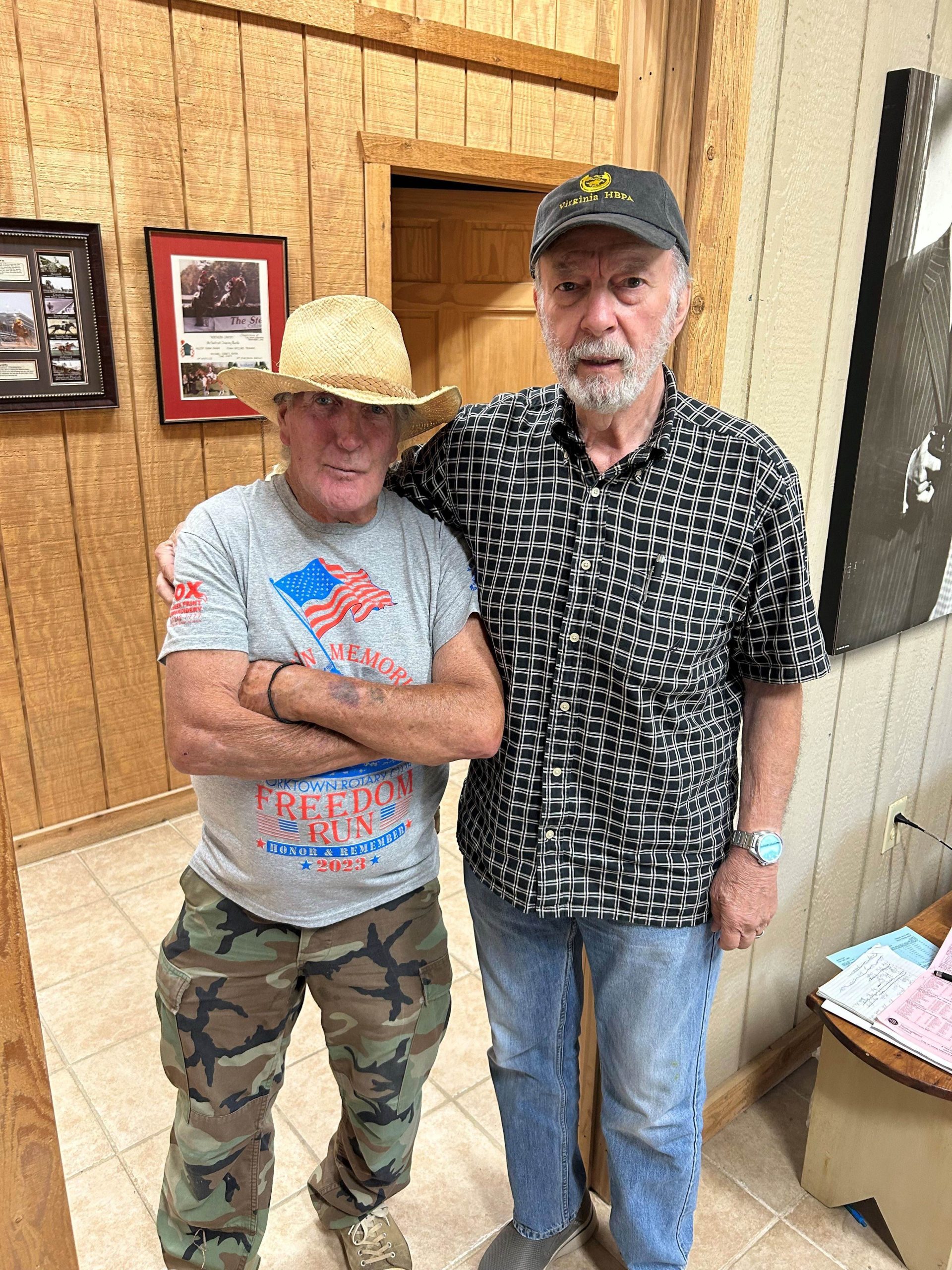
The VEA and Revolutionary Racing quickly joined hands, and in the 2018 session, HHR – similar to slot machines but using the results of actual past horse races — became lawful in Virginia.
“We were off to the races,” stated Petramalo.
Colonial’s ownership transitioned from Revolutionary Racing to Peninsula Pacific Entertainment and then to Churchill Downs, which acquired Colonial Downs in 2022 in a multifaceted sale. Some of the dynamics have changed since Petramalo first began representing the Virginia horsemen, but one key metric hasn’t.
“When I started out 20 years ago, we were running at $200,000 a day, and now it’s $700,000 a day. Most of that is generated by the horseman’s share of the HHR revenue,” Petramalo said. The state law requires the track operator to run at least one day of live racing for every 100 HHR machines operating in the Commonwealth, which helps to protect the horsemen’s interests.
“It looks like it’s going to continue [on an upward trajectory of purse revenue and days] contrary to most of the industry in the US because right now there are not quite 2800 machines installed and operating throughout the Commonwealth, but when the project in Dumfries gets transformed into the Rose next year, (mid-2024) what you will have is 1,000 [new] HHR machines,” Petramalo pointed out. “You’re looking at more than 4,000 machines in operation, which by law means that were going to have to run 40 days of racing.”
A statutory cap of 5,000 total HHR machines has been set by Virginia’s General Assembly. HHR is now a vital component of Virginia horse racing that was part of its rebirth, its present-day success and its future.
The results are clear. Colonial has enjoyed record handle in recent years, hosted its first-ever Grade 1 races this past season, and even saw a Virginia-bred win the Grade 2 Secretariat, the first time that race had been run in Secretariat’s home state.
But Petramalo believes there are still challenges to overcome.
“There are caveats to that [success],” he said. “The problem in my view is oversaturation of gaming in Virginia.”
Relatively new to the state are a plethora of other wagering options: sports gaming, fantasy sports, and casinos, while the lottery and charitable gaming have also undergone modernizations.
“How big of a market can you have for gaming? That’s the potential dark cloud on the horizon for horse racing,” warned Petramalo, who hopes to see Virginia eventually achieve 50 days of racing at $700,000/day. “That’s the long and short of the arc of horse racing in Virginia.”
The economic model for Virginia thoroughbred racing has soared, tumbled, gathered and sprung anew in Virginia over Petramalo’s tenure. Also new are the groups that Virginia horsemen have to work with.
“We have a challenge going forward with Churchill Downs. It’s a public held company and it’s a gaming company,” Petramalo said of the new owners of Colonial Downs. “Revenue comes from gaming, not horse racing. We have that concern going forward. We are going to be challenged by Churchill Downs going forward because they are very smart people and very professional, but they have their own interests to protect. So far, they’ve been fine. They are committed to making Virginia a success. I think they got a real big kick out of being able to bring those Arlington graded stakes here and run them at Colonial Downs.”
Another issue percolating in the state is the question of who should regulated the historical horse racing machines. It’s currently the state Racing Commission, but there’s chatter about moving it under the state lottery, which regulates casinos. Not so fast, says Petramalo.
“It doesn’t make sense for horse racing because the form of gaming (HHR), even though it looks like slot machines, it nonetheless tied to a particular industry, namely horse racing,” he explained. “HHR was passed by the legislature for the horse industry to revive it and make it grow. The point is that the VRC regulates not only horse racing but it should regulate the source of the revenue of horse racing.”
In 2023, Colonial Downs offered $19 million in purses over 27 days, 75% of which came from HHR says Petramalo.
Colonial has established a beachhead in the racing landscape that would have been hard to envision just a few years ago, much as Petramalo made a mark in the industry that his earlier career didn’t exactly foretell.
Petramalo was introduced to horse racing as a youngster in the harness country of western New York state when he cashed a $2 daily double ticket placed at a “bookie joint” on racing Batavia Downs for $18 when he was 13 years old. Perhaps it’s not the usual beginning for a future collective bargaining attorney, but there were no real options in those days for legal wagering on thoroughbreds in Rochester, New York.
“In my neighborhood, it was a big deal to follow the trotters,” recalled Petramalo, evidenced by the regular local newspaper coverage of harness racing at Buffalo, Vernon Downs and Batavia Downs.
When Petramalo moved to Washington, DC area in 1965 to go to law school, his interest in harness racing went with him, as he frequented Rosecroft Raceway on a regular basis. When one of his friends took him to the Middleburg Races in the early 1990s, Petramalo was introduced to steeplechase racing.
“My friend bought a horse and I said, ‘Well, maybe I should buy a horse,’” said Petramalo. “I bought a turf horse from Billy Turner that had gone through his conditions, and Diana McClure turned him into a steeplechaser.”
With the horses Petramalo owned early on, he saw a wide spectrum of talent. Oscar Max by Belmont Stakes winner Temperence Hill was “a real trooper” that loved to run on hard grass. Slew Supreme by Slew O’ Gold out of an Alydar mare named Supreme Queen, had the pedigree and looked the part.
“When I brought him home, the vet looked at him and said, ‘Wow, what a beautiful horse.’ This is going to be a stakes horse. Well, he turned out to the beautiful and nothing else,” recalled Petramalo of the regally bred horse he bought from Speedy Smithwick. Slew Supreme eventually ended up a show horse.
“It ran the whole gamut,” remembered Petramalo. “Horses are like human athletes. They’ve got all of the attributes and all of the foibles.”
When he retired from the law firm of Ermer and Brownell in December of 2004, and after serving a few years on HBPA board, Petramalo sought to fill a familiar role absent in the early years of racing in Virginia, negotiating for the benefit of horsemen and racing in the state, becoming the VHPBA’s first full-time employee.
“To me it was quite a natural role to play because for 35 years, before I lost my mind and went into horse racing,” laughed Petramalo in quick voice, “I was a labor lawyer in Washington, DC representing unions, negotiating collective bargaining agreements with management. It was basically the same thing. It was the same drill that I had gone through my professional life, and I enjoyed it.”
A recent study showed that in 2019 Virginia horse racing had an overall economic impact on the state of $542.1 million and employed over 5,000 people in a wide variety of jobs. But it’s not the numbers that have driven Petramalo; it’s the people.
Over the years in Virginia Racing Commission meetings, Petramalo continuously advocated to improve backstretch conditions, from replacing air conditioners and mattresses to providing medical services and transportation, services he took a hands-on role during morning hours on the backstretch. That’s had a big impact on the behind-the-scenes folks who make the sport go.
And he has high praise for the folks involved with the HBPA.
“In the 20 years I have either been either on the [HBPA] board, associated or working for the board, I have never worked with a better group of people,” Petramalo said. “They all have proved to be very smart, very easy to work with. Opiniated of course, but it’s been a true pleasure to work with people who are very competent and very smart and are passionate about what they do.”
LATEST NEWS



